|
|
|
Sort Order |
|
|
|
Items / Page
|
|
|
|
|
|
|
| Srl | Item |
| 1 |
ID:
131644
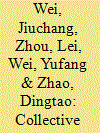

|
|
|
|
|
| Publication |
2014.
|
| Summary/Abstract |
Mass incidents are inevitable in contemporary China and the first thing we should learn is to adopt a correct attitude towards them. Based on the three elements-activity, interaction and sentiment-of collective behaviors in 52 mass incidents in China during 2007-2011, we find that collective behaviors in mass incidents show significant differences in activity, interaction and sentiment. A grade evaluation method is proposed to estimate the evolution of collective behaviors in 52 mass incidents and to classify such behaviors into five grades. Then the influence factors on the three elements are analyzed using multiple linear regression. The regression results demonstrate that the impacts of location, casualties, inner-group relations, group scale and duration on the three elements are very significant. Finally, in the light of the regression results, some implications of collective behavior in mass incidents are proposed for the relevant authorities in responding to mass incidents.
|
|
|
|
|
|
|
|
|
|
|
|
|
|
|
|
| 2 |
ID:
139174
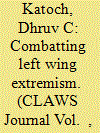

|
|
|
|
|
| Summary/Abstract |
The use of the term Naxalism has become synonymous with Maoist activities in India. All such activities are branded as Left Wing Extremism (LWE). The Maoist movement calls for a complete transformation of the political, social and economic systems as existing in India. In its essence, it challenges the validity of the Indian Constitution and rejects the Parliamentary system, seeking to replace it with a new social order. It draws its strength from existing weaknesses in society where certain vulnerable sections have been marginalised and exploited and, thus, can be penetrated and swayed by Maoist ideologues, who promise the people a fulfillment of their aspirations and a life of dignity and self-respect. The Naxal movement has a relationship to Communism. Karl Marx propounded that in order to fight feudalism and capitalism, “You must have a scientific philosophy and a sound theory, for a workers movement to be built up on a scientific basis”. In dealing with the problem of social change, Marx examined two concepts, the first dealing with the “forces of production” and the second with the “relations of production”. He was more interested in examining the military concepts of the social revolutionaries, which earlier lay in the domain of great political leaders, legislators and pioneering reformers. According to Marx, the social process would lead to revolution at a certain stage of development and the material productive forces of society would come into conflict with the existing relations of production. He emphasised that change could be
brought out only by revolution and not by peaceful means.1 The Naxal ideology flows from this line of thought.
|
|
|
|
|
|
|
|
|
|
|
|
|
|
|
|
| 3 |
ID:
123502
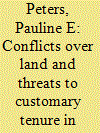

|
|
|
|
|
| Publication |
2013.
|
| Summary/Abstract |
The currently intense debate about 'land grabs' or 'land investment' in Africa has reinforced the significance of relations around land on the continent. This article argues that holders of land under customary tenure face increasing threat and that the role of foreign investors must not obscure the centrality of national agents - governments, political authorities and private actors - in land deals. The article first outlines the historical heritage of the colonial construction and post-colonial reproduction of customary tenure and its denial of full property to customary land-holders. The second part considers the escalating competition and conflict centered on land; the increase in land transfers implicated in the pervasive social conflict focused on land; and the associated rise in social inequality and contestation over belonging and citizenship. All these processes intensify the vulnerability of customarily held land in face of an escalation in efforts to acquire landed resources. The third and final part discusses 'land grabs', the most recent surge of international interest in African land, and the equally significant appropriation of land by national agents. The article concludes that the land question in contemporary Africa has to be linked to the dynamics of social transformation and inequality at multiple levels - global, regional, national, sub-national - that are reshaping not merely access to landed resources but the very bases of authority, livelihood, ownership and citizenship.
|
|
|
|
|
|
|
|
|
|
|
|
|
|
|
|
| 4 |
ID:
109082
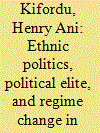

|
|
|
|
|
| Publication |
2011.
|
| Summary/Abstract |
Since the 1960s, intermittent social conflicts in Nigeria appear mostly linked to ethnic groups' differences. Considering the importance of regime change in social and political stability, this article critically analyses the historic and dynamic role of the core political executive elite in the political system's stability. The article argues that ethnic politics persist in Nigeria based on the nature of interactions between political institutions, institution-builders, and society. It asserts a contradictory link between deep-rooted elite interests and popular preferences in ways that undermine orientations towards democracy. The empirical focus is on the composite nature of the core political executive elite analysed through their ethnic and educational backgrounds. It is observed that, although ethnic shocks are variously motivated, the atypical shape and inequity in power and role distribution at the highest levels of executive office-holding stand out as a salient source and target of antagonism by ethnic groups. This finding has a paradoxical implication: deep-seated economic and political interests of the elite play a diversionary role from the real causes of ethnic conflicts in Nigeria.
|
|
|
|
|
|
|
|
|
|
|
|
|
|
|
|
| 5 |
ID:
073326
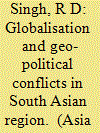

|
|
|
| 6 |
ID:
122807
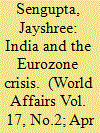

|
|
|
| 7 |
ID:
182431
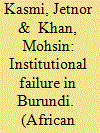

|
|
|
|
|
| Summary/Abstract |
Ethnic and land conflicts have recently gained significance in peace and conflict resolution. It is imperative to understand both endogenous and exogenous factors and their relations towards the institutional, democratic, and state-building process to mediate the risks of class and land conflicts. This paper attempts to identify historical relations of land and class structure by analysing Burundi land and class conflict and its significance for peace and stability. We found that the imbalance of land ownership and class structure in a society leads to armed conflicts, leading to an outbreak of other social conflicts, including violence, forced displacement, paralyzed land governance, and power relations changes. Hence, there is a dire need to foster reintegration and reconciliation through balanced multiple diplomacies in Burundi, enhancing state legitimacy towards sustainable land tenure security, improving state capacity, and ensuring justice in the reconciliation process, in association with local and regional powers.
|
|
|
|
|
|
|
|
|
|
|
|
|
|
|
|
| 8 |
ID:
139249
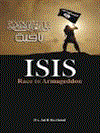

|
|
|
|
|
| Publication |
New Delhi, VIJ Books India, 2015.
|
| Description |
xiv, 170p.Hbk
|
| Standard Number |
9789384464776
|
|
|
|
|
|
|
|
|
|
|
|
Copies: C:1/I:0,R:0,Q:0
Circulation
| Accession# | Call# | Current Location | Status | Policy | Location |
| 058244 | 303.625/RAS 058244 | Main | On Shelf | General | |
|
|
|
|
| 9 |
ID:
121830
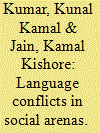

|
|
|
|
|
| Publication |
2013.
|
| Summary/Abstract |
This paper argues that our understanding of the issues related to language conflicts inside business organizations would be enriched by close analysis of the conflicts that take place in the larger arena of the social sphere, of which the business organizations are a part. Taking clues from earlier studies, the paper argues that the prime reason behind linguistic conflicts is the fear of loss of linguistic identity by the linguistic minorities. It is further debated that the same factors related to the loss of linguistic identity would play a role in the business arena as well where the official language of the workplace puts its native speakers in an undue advantageous position with respect to other members who have learnt the official language as their second language.
|
|
|
|
|
|
|
|
|
|
|
|
|
|
|
|
| 10 |
ID:
170192


|
|
|
|
|
| Summary/Abstract |
Because of the heavy burden that the resolution of social conflicts imposes on the Chinese government, the government is motivated to delegate or shift its conflict resolution responsibilities to specialized institutions, including social organizations. However, the effectiveness of responsibility shifting is conditional on the types of conflict and social contexts. Focusing on the resolution of medical disputes in China, this article examines the conditions under which the government can avoid direct and heavy involvement in dispute resolution. The government can effectively delegate the responsibility for resolving conflicts when the disputing parties perceive the mediation agencies as impartial. Having effective institutions thus limits government intervention to only a small number of disputes. This study is based on an analysis of 1351 medical disputes and about 80 interviews with parties involved in dispute resolution.
|
|
|
|
|
|
|
|
|
|
|
|
|
|
|
|
| 11 |
ID:
129455


|
|
|
|
|
| Publication |
2014.
|
| Summary/Abstract |
There has been a long-entrenched view that China's Qing Dynasty was a 'Manchu Dynasty', which imposed alien conquest on China's majority of the ethnic Han. Such a view has made the Manchus allegedly responsible for all the social evils from the 1840 Opium War onwards on the one hand and all the 'anti-Manchu' sentimentalities and movements, such as the Taipings and Republicans, automatically legitimate and revolutionary on the other. This article challenges this stereotype and argues with historical evidence that the 'Manchu rule' was a myth. Social conflicts in late Qing were mainly between the Han Chinese themselves. It is time to end the 'Manchu rule' as an easy pretext to conceal the true social issues and problems in the nineteenth- and twentieth-century China.
|
|
|
|
|
|
|
|
|
|
|
|
|
|
|
|
| 12 |
ID:
131381
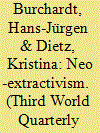

|
|
|
|
|
| Publication |
2014.
|
| Summary/Abstract |
This paper addresses new challenges and identifies starting points for development theory following recent debates in Latin America on 'new or neo-extractivism'. It focuses on the concept of neo-extractivism and the context of its emergence, and on the changing role of the state. Looking at a number of social economic indicators, we find that, even after considering differences between countries, (neo-)extractivism is not merely a temporary economic strategy in the region. Instead, it exhibits features of a consolidated development project. Empirical evidence from the region shows the fundamental implications of resource-based development paths in politics, social relations and territorial orders. To grasp these implications conceptually, we argue for a shift in theoretical perspectives related to the link between development and resource extraction. Key elements for such a shift are to be found in recent studies in rentier theory and politics and new approaches in the field of political ecology.
|
|
|
|
|
|
|
|
|
|
|
|
|
|
|
|
| 13 |
ID:
128312
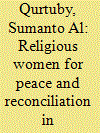

|
|
|
|
|
| Publication |
2014.
|
| Summary/Abstract |
Sumanto Al Qurtuby, discusses how women bridged the Muslim/Christian religious divide that had brought interreligious conflict to eastern Indonesia during a transition to greater democracy after the downfall of Suharto in 1988. The author argues that it is wrong to assume that all women promote peace. In Indonesia, many women fought to support the triumph of their own religion through violence. However, some of these women combatants abandoned violence and joined the interfaith peacebuilding efforts of others after they began to take traction.
|
|
|
|
|
|
|
|
|
|
|
|
|
|
|
|
| 14 |
ID:
131513
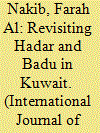

|
|
|
|
|
| Publication |
2014.
|
| Summary/Abstract |
Kuwait today is 99 percent urbanized. Though hosting a substantial desert population in the past, Kuwait no longer contains any Bedouin who practice a nomadic or pastoral lifestyle. And yet the term bad? remains in popular use in Kuwait to designate a group considered sociologically and culturally distinct from the ?a?ar, or settled urbanites, which in Kuwait's context refers solely to descendants of the pre-oil townspeople. This article explores why these social designations still exist in Kuwait and analyzes the origins of the conflictual relationship between the two groups. I argue that the persistence of the ?a?ar/bad? dichotomy is an outcome of state-building strategies adopted in the early oil years, mainly linked to citizenship and housing policies, that contributed to fixing ?a?ar and bad? as not only socially distinct but also geographically bounded groups. These state policies implemented between the 1950s and 1980s fostered the political integration but social exclusion of the bad?. The article examines the lived realities of these incoherent policies as one way of explaining how the bad? shifted from being the rulers' main loyalty base in the early oil decades to becoming their primary opposition today.
|
|
|
|
|
|
|
|
|
|
|
|
|
|
|
|
| 15 |
ID:
081199


|
|
|
| 16 |
ID:
129797
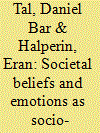

|
|
|
|
|
| Publication |
2014.
|
| Summary/Abstract |
An outsider observing the Israeli-Palestinian conflict might ask him or herself why, after so many attempts and initiatives have been placed on the negotiations table, the adversaries have failed to reach a settlement. Indeed, the "two-state solution" paradigm has been accepted by the majority of people in both societies for over a decade now (Bar-Tal, Halperin, & Oren, 2010), but the parties appear still far from reaching the desired resolution. Moreover, the solutions proposed over the years of negotiations by both officials and non-officials follow a similar paradigm and have in fact established clear contours to a possible peaceful resolution of the conflict. In fact, the Clinton Parameters from 2001, the Arab Peace Initiative from 2002, and Israeli Prime Minister Ehud Olmert's proposal from 2008 all identify the need to partition the land along the 1967 borders, transfer control of the eastern neighborhoods of Jerusalem to the Palestinians, find a fair solution to Jerusalem's holy sites, and formulate a just and agreed-upon solution to the Palestinian refugee problem (Lavie, 2010). Thus, one might ask: If the solution is so clear, what is holding the parties back?
|
|
|
|
|
|
|
|
|
|
|
|
|
|
|
|
| 17 |
ID:
044212
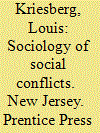

|
|
|
|
|
| Publication |
New Jersey, Prentice Press Inc., 1973.
|
| Description |
xiv, 300p.
|
| Standard Number |
0138215464
|
|
|
|
|
|
|
|
|
|
|
|
Copies: C:1/I:0,R:0,Q:0
Circulation
| Accession# | Call# | Current Location | Status | Policy | Location |
| 011918 | 303.6/KRI 011918 | Main | On Shelf | General | |
|
|
|
|
|
|
|
|
|